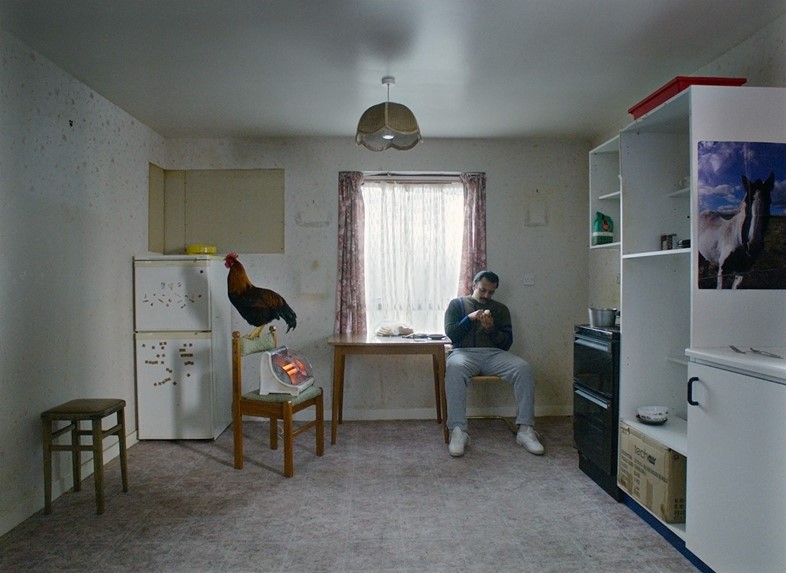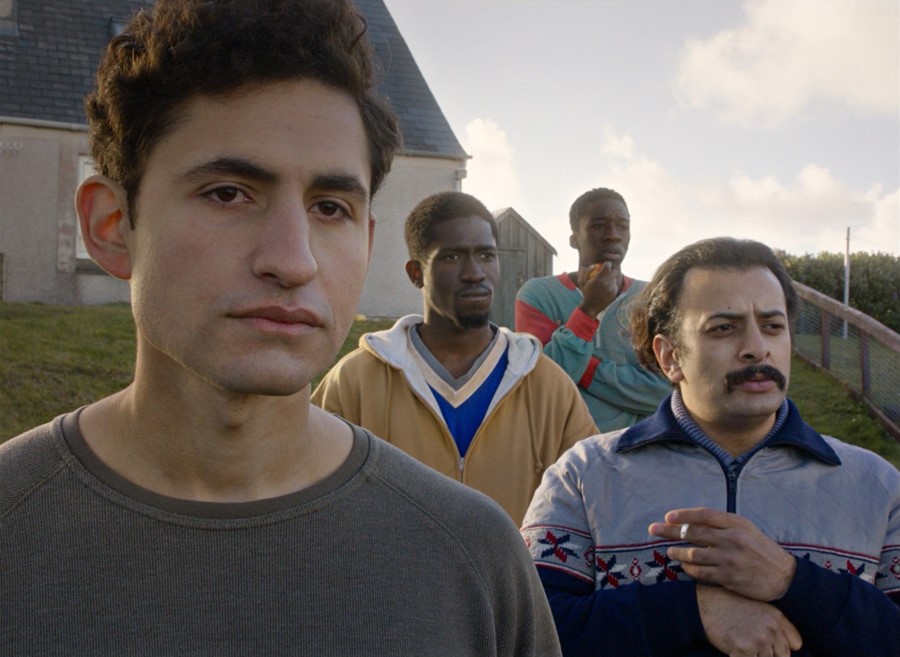“Omar tells his own story, there’s no western saviour making sure he’s in a better position”: Amir El-Masry opens up about his role in Ben Sharrock’s new film about asylum seekers left stranded indefinitely on a fictional Scottish island
“Freddie the chicken had a stunt double,” says Amir El-Masry of the bird that gives him an alarming wake-up call halfway through Ben Sharrock’s sophomore feature Limbo. “Clearly the budget went to the star of the show.” In reality El-Masry (Industry, The Night Manager) is very much Limbo’s star, but in sharing this detail about his scene partner(s) – named Freddie Jr after the Queen frontman – he echoes the comedy that runs through the otherwise keenly heartfelt and frequently devastating film about asylum seekers left stranded indefinitely on a fictional Scottish island.
As Omar, a Syrian refugee who wanders around the island in a striking turquoise coat, his right wrist in a pink cast, El-Masry is fiercely reserved, his expression typically deadpan. Born in Cairo and based in London, the actor was initially tentative about potentially portraying a stereotype, but quickly fell for the project after reading Sharrock’s early blurb. “Omar tells his own story, there’s no western saviour making sure he’s in a better position,” he explains. “He’s made his own decision and he’s also constantly reminding the audience how much he loves his country; reminding everyone around him that he wouldn’t want to be anywhere else other than back home with his family playing music.” In Syria, Omar had enjoyed some fame playing the oud, and in Scotland, he carries the instrument around wherever he goes.

While Sharrock, who studied Arabic and politics, wrote the film after spending a year in Damascus and later in southern Algeria working with an NGO at a refugee camp, El-Masry’s primary research came from a Syrian single male group in Edinburgh. “We’d sit with them and hear their stories, and just kind of find out little nuances,” he tells AnOther. “They were very kind to share their intimate stories, but it was more important to find all the natural human elements. So what I found was the humour – they managed to laugh throughout our meetings, and I think that’s a testament to their strength, but also their culture. Coming from a British-Egyptian background, we tend to laugh at our mishaps and misfortunes. That also happens in the Middle East, using humour to escape from any problems or woes.” Omar, he continues, is an amalgamation of the stories they heard while his on-screen accent, for which he had to undo his fluent Egyptian Arabic to capture the Syrian dialect, was mastered through sharing voice notes with Sharrock’s former teacher.
With the ugly mechanics of a divisive asylum process at its core, Limbo is inherently a political feature. But it’s more than that, asserts the actor, who is anxious to foreground the film’s broader understanding of humanity. “I think Ben’s intentions were that it could happen to anybody. The idea of being stripped away from your identity – we all go through that at some point, if we’re far away from home or separated from our families for any reason, and it’s those relatable themes he wanted to highlight,” says El-Masry. “But importantly, on the subject matter, we don’t have a feeling of pity towards the refugees, we wanted to make sure that they were treated as human beings, like all of us.” Indeed, Omar’s housemates – Farhad, Abedi (Kwanbena Ansah) and Wasef (Ola Orebiyi) – are all provided lighter moments that exist, if loosely, outside of their situation, such as Abedi and Wasef squabbling about whether Ross and Rachel were on a break. Similar cultural references – Instagram kittens, Jerry Maguire – are dispersed throughout the film, offsetting the picture’s more emotional content.
Limbo is the first film to be shot on Uist in the Outer Hebrides, a group of six small islands with a population of about 3,500 at the 2011 census, which stands in for the film’s imaginary waiting room. El-Masry, who had previously never heard of the island, describes the locals as highly receptive to their arrival. “So helpful. It was so windy and we had almost gale force conditions on the island – people were helping us hold down pieces of equipment from flying off. One guy, a farmer, helped us use his boats and his sheep, it was great; he just wanted to do it for the love of it. And I think that’s testament to the energy on set. People wanted to go beyond their job description to make sure this film got made.”
That it did get made, with all that nature threw at them, is something close to a miracle he says today. Having fought “tooth and nail” to be involved, El-Masry holds the project particularly close. “Honestly when I read the script, I knew it was going to be special,” he remarks of the film’s distinctive voice. “I just had so much trust and faith in the whole team, they were so behind the project from day one, like something I’ve never seen before.” The film received a similarly warm reception at early festival appearances, while El-Masry went on to be nominated for best actor at the British Independent Film awards. Speaking to AnOther on release day, he’s keen for audiences to “take away the fact that if you can lead with love, you can go a long way. It’s much easier to integrate when people wear their hearts on their sleeve, rather than feel threatened.”
Limbo is out now.
